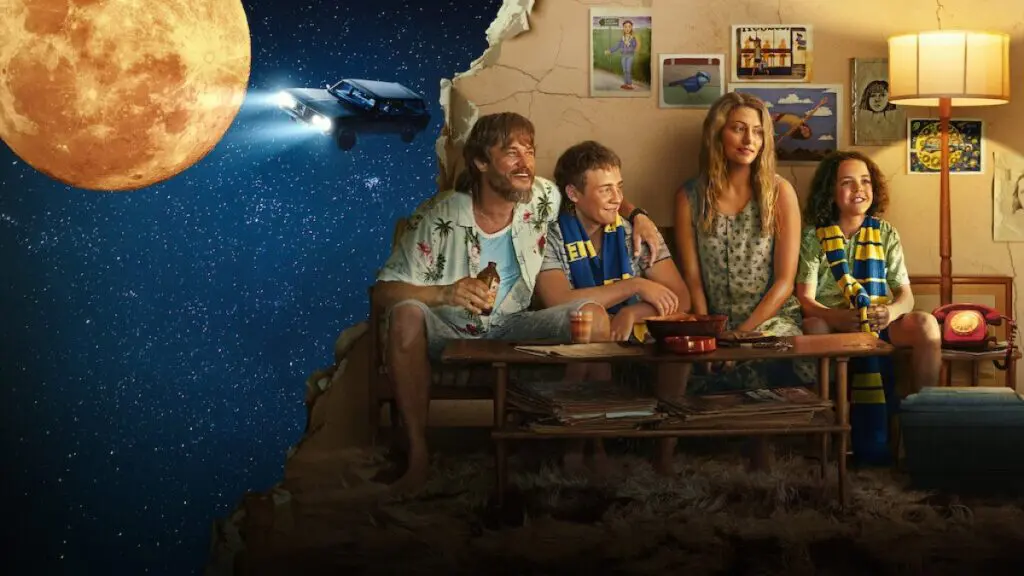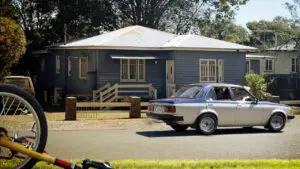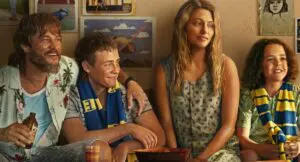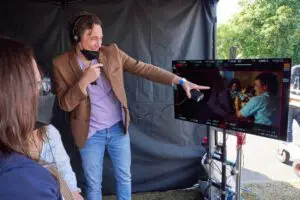Summary
Its more fanciful elements won’t be for everyone, but Boy Swallows Universe is a surprisingly layered and empathetic coming-of-age story quite unlike anything else.
Boy Swallows Universe is a very odd show, but mostly in the best possible way. Adapted from Trent Dalton’s novel and filmed in Brisbane, the seven-part Netflix series takes some big conceptual swings, dabbling in supernaturalism but remaining rooted in the gritty spirit of 80s Australia and its criminal fringes. Season 1 doesn’t all work, but it never tops trying to for a moment.
At its root, this is a coming-of-age story, which are ten-a-penny on all streaming platforms, but you can’t move for them on Netflix. Still, Eli Bell’s (Felix Cameron) adolescence is unusual even by the standards of TV drama. His brother, Gus (Lee Tiger Halley), hasn’t spoken a word for years but may or may not be able to see the future. His mother, Frankie (Phoebe Tonkin), is a drug addict, and his stepfather, Lyle (Travis Fimmel, superb), is a small-time dealer. His biological father is an alcoholic and his main male role models outside of Lyle are Slim (Bryan Brown), a convicted murderer and escaped convict, and a pen-pal currently languishing in prison.
The plot proper is kick-started by Lyle’s attempts to better the family’s circumstances, inadvertently earning the ire of a Vietnamese supplier and a psychotic enforcer with a boogeyman’s reputation. Pretty soon, Eli and Gus are on their own, or close to it, bouncing between various elaborate and sometimes lightly fantastical scenarios while delivering often hysterically foul-mouthed working-class running commentary.
The secret weapon of the show’s drama is an earnest sense of compassion for all its characters, perhaps especially its most downtrodden. Lyle, around whose charisma the first few episodes revolve, is a deeply sympathetic guy whose bad decisions are well-intentioned. Even someone like Eli and Gus’s father Robert (Simon Baker), who is initially presented as quite cartoonishly useless and self-involved, has layers of trauma and sentiment hidden beneath his drunken, unshaven exterior.
The sharp eye for authenticity of very working-class communities – stemming from Trent Dalton basing the book on his own experiences – keeps the story from feeling preachy or superior. It isn’t judging its characters or condemning their circumstances; it makes a spirited effort to understand everyone and communicate to its audience why everyone, or at least almost everyone, is worthy of a second look. The energetic, almost anthological journey through Eli’s eccentric life is full of surprises but always maintains a strain of sincerity.
This sincerity is why the show’s magical realism elements work – or at least why they worked for me. There isn’t an overwhelming amount of this stuff throughout, and some of it has a logical explanation, just a child’s traumatized mind working overtime to rationalize fraught circumstances. But there are some outright otherworldly or at least outlandish aspects that are almost always deployed to make a deeper, more thoughtful point, and the payoff is always worth the suspension of disbelief.
Boy Swallows Universe has empathy to spare
At the most simplistic possible level, Boy Swallows Universe stands out because it isn’t like very much else. But it isn’t out there in a thoughtless, try-hard way, but instead a deeply considered one. Its characters contain multitudes and are phenomenally likable; its villains are cartoonishly awful, the way a child might conjure them in his mind.
But beneath all this is a beating heart and sense of empathy that most television lacks. Calling it social commentary would perhaps undersell how fun it is moment-to-moment, but one can’t overstate how well-observed and thoughtful it can be. I’m not Australian, but I am working-class and from a battered community a lot like this one; I saw my childhood in its neighborhood eccentrics and felt reassured by its refusal to condemn those who drink a little too much or flirt with criminality to get by or imagine a better life for themselves and their families. It’s well worth a look.
RELATED:




